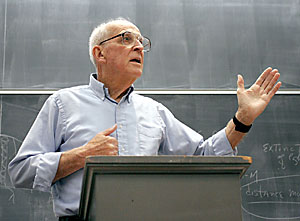 |
|
JAKE LACEY/Arizona Daily Wildcat
|
Dr. Coyne lectures on visual binary systems during his class yesterday morning. Along with being a professor of astronomy he is also an ordained Roman Catholic priest and the director of the Vatican Observatory in Rome.
|
|
|
By Andrew O'Neill
Arizona Daily Wildcat
Wednesday, March 23, 2005
Print this
To say this man looks to the heavens for answers is an understatement.
While most people would be satisfied with one profession, he has two.
Professor George Coyne has held a variety of positions at the UA since 1965, where he is an adjunct professor of astronomy in the College of Science.
Coyne is teaching one section of NATS 102 this semester, "The Physical Universe."
But Coyne is not your average astronomer.
He is also a Roman Catholic priest, specifically a member of the Society of Jesus (Jesuits), a rigorously intellectual order of religious men founded by St. Ignatius of Loyola in the 16th century.
In addition to his teaching responsibilities, Coyne serves as the director of the Vatican Observatory at Castel Gandolfo in Rome, which is staffed by Jesuit priests. He has held the position since 1978.
The Vatican also operates the Vatican Observatory Research Group at the Steward Observatory on campus.
Thanks to a unique arrangement, Coyne is able to spend part of the year conducting research in Rome and the other part teaching at the UA.
In a world where there have been many clashes between religion and science, Coyne said he is comfortable in his dual roles as both priest and astronomer.
"I don't see any contrast between the two," Coyne said. "Wherever there has been conflict, there has been ignorance on one side or the other, or both."
Coyne said these conflicts have been episodic and does not believe the Catholic Church is hostile toward science now.
In fact, Coyne said he credits Pope John Paul II for being more open to science than any previous pope and said the pontiff has been a driving force behind getting the church involved in dialogues with various scientific disciplines, particularly astronomy.
In many respects, Coyne's life reflects the dramatic changes in both scientific discovery and religious life in the 20th century.
One of 10 children, Coyne was born and raised in Baltimore, where he attended a Catholic elementary school and Loyola high school, a Jesuit school for boys.
He said he admired the priests who taught him in high school and decided to enter the order after graduation when he was 18.
Coyne said his formation process for becoming a Jesuit involved several years of study, with particular emphasis on classical languages, literatures and history.
Coyne said while in college, he had a professor of Greek language and literature who got him interested in the study of astronomy.
"He was the greatest teacher I ever had for conveying enthusiasm for anything intellectual," Coyne said.
Coyne said the rules were so strict for seminarians when he was in college that students were only allowed to read books pertaining to classical studies, which meant astronomy books were out of the question.
With the help of his Greek professor, Coyne said he was able to circumvent the rules and study astronomy texts in his spare time.
"It was fascinating because it was forbidden fruit," Coyne said.
He earned a bachelor of arts degree in Mathematics and a licentiate in philosophy from Fordham University in New York in 1958.
He said he was fortunate to come of age at a time when space exploration was in its infancy, and he was encouraged by his religious superiors to pursue graduate study in astronomy at Georgetown University in Washington, D.C.
Coyne graduated from Georgetown in 1962, where he completed his dissertation on a spectrochemical analysis of the lunar surface. This was followed by graduate study in theology in his native Maryland.
In 1965, the same year he was ordained to the priesthood, Coyne said he began his affiliation with the UA as part of a summer research program. He said he also began his work at the Vatican Observatory during this time.
Coyne joined the astronomy faculty at the UA in the 1970s.
Given Coyne's credentials, his class might seem a bit intimidating but students said they enjoy his teaching style.
"I love it. I think he's a great teacher," said Leah Bird, an anthropology junior. "He makes the material interesting and accessible."
Other students said they appreciate Coyne's sense of humor when he teaches.
"He's a funny guy. He says stuff you wouldn't expect from a religious man," said Charles Allen, a pre-business freshman.
Coyne said he strives to communicate the culture of science to students.
"I love trying to get across to non-science majors what makes a scientist tick," Coyne said.
He said the mission of the Jesuits is "contemplation in action," and the week before Easter reminds him of the importance of prayer and reflection in everything he does, even in the midst of a busy schedule.
"Your work should be a prayer," Coyne said.
